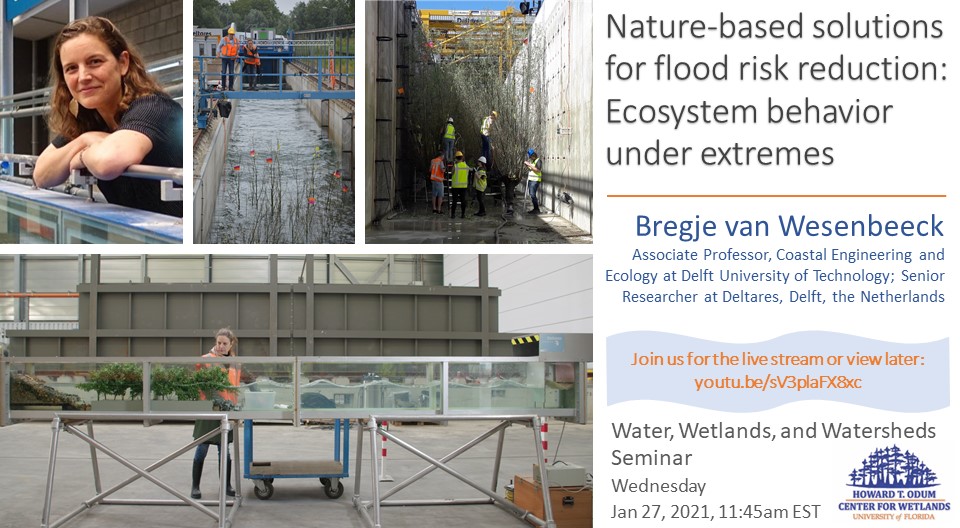January 27, 2021
Nature-based solutions for flood risk reduction: Ecosystem behavior under extremes
Bregje van Wesenbeeck, Associate Professor, Coastal Engineering and Ecology at Delft University of Technology; Senior researcher at Deltares, Delft, the Netherlands
Join us for the live stream Jan 27, 11:45am EST, or view later: https://youtu.be/sV3plaFX8xc
Abstract
Nature-based Solutions receive increased interest for flood risk mitigation and climate change adaptation. However, we know little about how ecosystems respond to extreme pressures that occur under heavy storms. Wave attenuation of marshes and mangroves has been measured under benign conditions but in the field measurements of higher waves and higher water levels and ecosystem response to this are scarce. Therefore, we are conducting a series of experiments under controlled conditions in the largest flumes in the world testing how marshes, floodplain forests and mangroves respond to extreme hydrodynamic forcings. Also, we are investigating whether regular rules for wave attenuation by vegetation can be derived out of these experiments with the final aim to include natural vegetated foreshores in riverine and coastal flood risk reduction schemes.
Bio
Dr. Bregje van Wesenbeeck is an expert advisor on nature-based solutions and ecosystem-based adaptation at Deltares and an associate professor at the Delft University of Technology. She has provided advice on flood risk reduction, erosion mitigation and climate change adaptation in amongst others Indonesia, Tonga, Kiribati, the Philippines, the Netherlands and USA. She possesses unique knowledge of both green and grey intervention strategies as she has affinity with both ecology and civil engineering. She wrote guidelines for implementation of Nature-based Solutions (NbS) for flood risk reduction for the World Bank and on natural river management for the Asian Development Bank. Her research focusses on mangrove restoration and on testing NbS, such as marshes, floodplain forests and mangroves, under extreme wave conditions in one of the largest wave flumes in the world at Deltares. This experimental work is used to improve numerical models to increase reliability and predictability of NbS functioning. Her works is a unique combination of strengthening the scientific foundations and furthering practical application of nature-based solutions. She is invited to present her work on many international conferences and workshops and has a still growing publication list in peer-reviewed journals.
Seminar postcard

